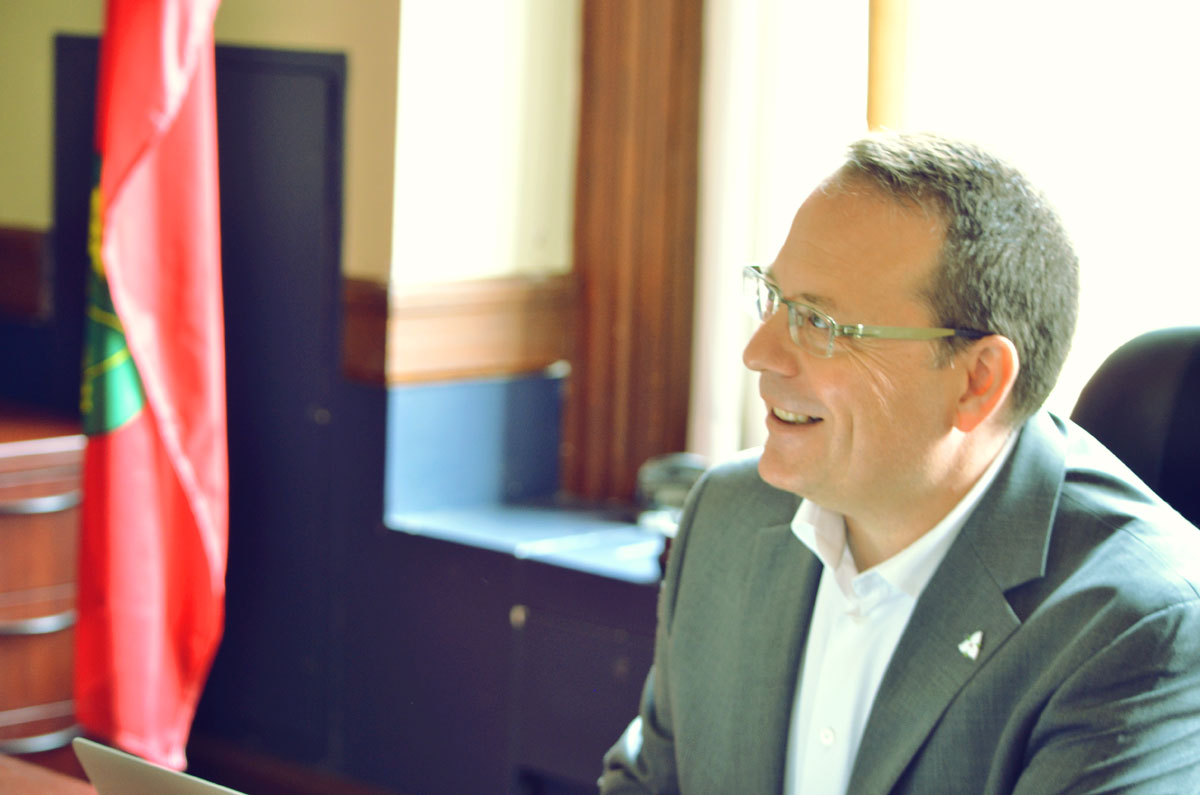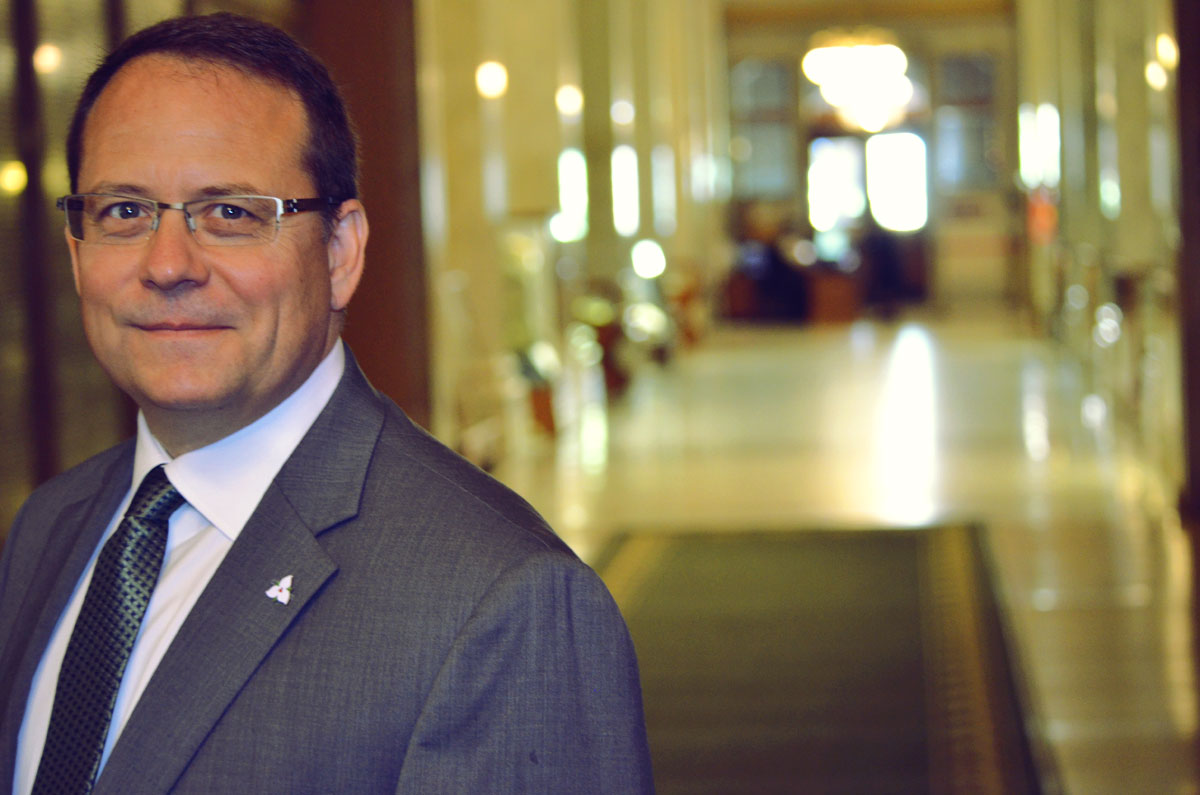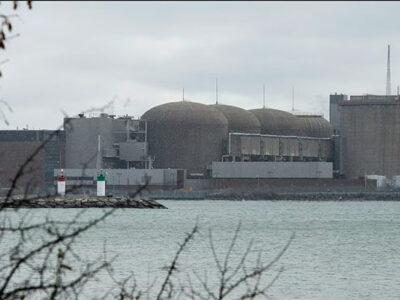The Green Party of Ontario (GPO) is a political party in the province of Ontario, Canada, led by Mike Schreiner. Until 2018, it had never held any seats in the Ontario Legislative Assembly. But this all changed when leader Mike Schreiner received over 45 percent of the vote in Guelph and became the first elected Green MPP in Ontario history.
Mike acknowledged it’s been a fight to get his party into the legislature, and credited his team of supporters and candidates across the province for helping lead him to victory.
Schreiner campaigned on a platform that promised to move Ontario to 100 percent renewable energy and plans to work towards the closure of the nuclear energy plant in Pickering. Even as the single party member elected, Shreiner said he believes he can help shift Ontario policy and make an impact. But how?
We (pvbuzz.com) got a rare chance at an interview with the busy MP to discuss his calling to politics, the road ahead, what he makes of the tumultuous state of the current Ontario energy policy, and how he plans to make a positive impact.
What was your background prior to entering politics?
Before entering politics, I was a leader in the nonprofit sector and a small business owner, starting two successful organic food companies, including one of the first organic home delivery company in southwestern Ontario.
I was the co-founder of Local Food Plus, a non-profit connecting local sustainable farmers with consumers in Ontario. Both my businesses and non-profit have won numerous environmental and business awards.
Growing up on a farm, I’ve always had an interest in food production and sustainability. My parents taught me at a very young age the importance of being a responsible steward of the land and water that sustains us.
What got you started in Green politics?
I’ve always been a bit of a political junkie. But I became disappointed with conventional party politics as a young adult until I discovered the Green Party.
unlike the three status quo parties, the Green Party has bold ideas to address climate change and income inequality, put people and principle before partisan political games and base policy on values that I support.
As I saw politics in Ontario turn from bad to worse, I felt compelled to get involved. For years, I saw successive governments ignore the major issues of our time – climate change, poverty, mental health.
My family encouraged me to get more involved, to move from the sidelines to the frontlines of making political change.
The emerging Green Party around the world and across Canada inspired me that a new way of doing politics was possible.
The Green Party was a natural fit for many reasons. I’m a strong believer in local democracy; in preventative approaches to problems, whether it’s fixing our health care or electricity systems; and in taking care of the land, air and water that sustains us.
“The Green Party understands the urgent need to act on the climate crisis. The Green Party doesn’t shy away from honest conversations and bold ideas. We’re not tied to special interest groups, and we don’t play wedge politics.”
The Green Party is the only party making decisions based on benefiting the next 7 looking generations, not just voters in the next election.
I want to leave a livable planet for my two daughters, and that’s why I’m so proud to lead the Green Party of Ontario and serve as MPP for Guelph.
What has been your inspiration throughout your 9 years as the GPO leader?
People who put service above self-inspire me. No one joins the Green Party to get easy access to power or secure a government contract. They get involved to be part of a movement fighting for practical solutions to the big challenges we face. Our members, supporters, volunteers, and staff inspire me.
As Canada’s first elected Green, Elizabeth May is a mentor, friend, and inspiration. She is a force in Canadian politics and has made the election of Greens at the provincial level possible.
She’s won almost every individual award an MP can earn, including Parliamentarian of the year. She is setting an example that politics can be done differently with decorum and respect. She puts people and planet before the party and is a role model for all elected Greens.
Elected Greens like Andrew Weaver in BC, Peter Bevan-Baker in PEI and David Coon in New Brunswick have shown what a difference even one Green MLA can make. They’re challenging politics, as usual, demonstrating that the Green Party is a credible choice and a hopeful alternative to the status quo.
Guelph, as a community that has a lead on many issues dear to me, inspires me to lead change at Queen’s Park. Guelph represents a lot of what I believe in – a thriving small business climate; innovation in food, water, and clean energy; engaged citizens; a culture of caring and serving community.
Finally, I find inspiration in nature. The power and beauty of a forest, a lake, the mountains, ocean waves and a running a river never cease to inspire awe and appreciation. I love paddling a canoe, cycling a rural road, and hiking a trail immersing myself in nature, enjoying the flora and fauna of Mother Earth.

Here are questions that we would like to ask on behalf of the solar industry:
You’ve said previously Ontario has to “Seize the $6 trillion global clean jobs opportunity”, Where are you drawing that figure from?
The number has been cited in a few places, but most recently by Mark Carney – Governor of the Bank of England and former Governor of the Bank of Canada.
It’s estimated that the current cleantech economy is $7 trillion, but estimates keep going up. And if Ontario percent just one percent of that, it would make it the largest contributor to our GDP, greater than even the auto sector.
Already there are more Canadians working in clean energy than in the oil sands – 274,000 as of 2016. We need to be skating to where the puck is going, not to where it’s been.
According to the Pan-Canadian Climate Framework, 118,000 jobs could be created in energy efficiency actions across the country. There are estimates that the 758 canceled clean energy contracts could cost Ontario 6,000 jobs and over $500 million in expected investment.
Much of this investment is running to other jurisdictions that are more hospitable to the clean economy.
It’s simply foolish for Ontario to continue pouring money down the nuclear drain, proposing gas tax cuts, and canceling energy efficiency programs. The Premier is declaring war on the modern world and it’s bad for business, job creation, and our environment.
“I will fight against the Premier’s efforts to close Ontario for businesses in the clean economy. I will work with municipalities like Guelph and Oxford County who have embraced a goal of being powered with 100% renewable energy.”
First, we have to stop Premier Ford from moving us backward, canceling clears energy contracts, energy efficiency programs, and climate plans.
Next, we have to stop wasting money on outdated, overpriced nuclear rebuild projects. If Ontario wastes $13 to $32 billion rebuilding Darlington, the province will have little grid capacity for renewable energy and will likely be stuck with expressive stranded assets.
During the campaign, I committed to re-directing the government’s business support programs and incentives to support the scale-up of cleantech companies and innovation.
As MPP, I will fight for programs to support clean economy innovation and efforts to save money by saving energy. Energy economists estimate that Ontario could save $1.1 billion per year by not extending Pickering’s operating license.
Greens would redirect those saving to a multi-billion dollar program for green building and innovation to make our homes and businesses more energy efficient. Energy efficiency creates jobs and saves people money by lowering their energy bills.

I support an independent, public review of the costs and environmental impacts of all sources of power generation. Our province needs to have an honest conversation about energy prices. Given the dramatic drop in the history. of renewable energy, it is essential that Ontario not lock itself into expensive sources of energy.
Renewable energy is quickly becoming cost competitive with coal, nuclear and gas. We need to take advantage of this and do it in a way that supports the democratization of energy.
Unlike the Liberal’s Green Energy Act, which put corporate contracts before community power, Greens support procurement requirements for local ownership and community power.
Greens also support using government procurement rules to support the commercialization and scale-up of clean innovation. We support updating building codes to promote net zero and passive house standards and to ensure that new homes are solar ready.
We can create a more hospital business climate for clean innovation by using public sector institutions and infrastructure to lead way.
Follow up: what step does Ontario need to take to benefit the most from this opportunity?
Finally, Greens support making polluters pay for the damage they cause. 81% of economists believe carbon pricing is the most market-friendly and economical way of reducing GHG emissions. We took issue with the Liberals’ cap-and-trade program, but it was better than nothing, which is what Ford is pushing.
The Green Party believes in a carbon fee-and-dividend program that prices pollution at a high rate to achieve serious emissions reductions while returning all of the revenues to people to help them transition to a low carbon future.

Follow up: what do you see as the consequences of missing the global clean jobs opportunity?
It’s bad for business, it’s bad for our economy and it’s bad for our future prosperity. We’ve already heard from the Business Council of Canada and the Ontario Chamber of Commerce that ripping up green energy contracts shakes investor confidence.
The Premier’s actions send the wrong message to businesses about the reliability of doing business in Ontario.
“If Ontario fails to embrace the clean innovation that is transforming the world right now, then we’ll be on the outside looking in.”
The Ford government is getting out of the green energy business when prices are plummeting and the storage technology is rapidly improving. This doesn’t make sense.
Studies show that the best way to lower energy bills is through energy efficiency and conservation – and these retrofits can create tens of thousands of jobs. Rather than pouring more money down the nuclear drain, Ontario could become a global leader in nuclear decommissioning and export this expertise around the world.
Clean jobs are also the best use of our investment.
Studies show that for every dollar invested, you can create 7x more jobs in the cleantech sector than in fossil fuels. This is where the world is moving. Will Ontario be a leader and job creator? Or will we miss out on this historic opportunity?
My home riding of Guelph is in the heart of the Waterloo-Toronto corridor, which is one of the global hubs for innovation and research, employing tens of thousands of Ontarians.
I will fight for my constituents and clean economy companies across the province. Our prosperity depends on it. And more importantly, my children’s future depends on it.
Where do you see the future of energy generation in Ontario?
First and foremost, Ontario must use energy more efficiently. The lowest cost solution to our energy needs is to stop wasting so much of it.
Next, Ontario will need a mix of renewable energy and storage solutions. In the short-term, we should purchase low-cost water power from Quebec instead of wasting billions on outdated, overpriced nuclear power.
We can buy Quebec water power for 5c per kWh instead of paying 17c per kWh for rebuild nuclear. Next, we need to support locally owned wind, solar, biomass and geothermal sources of generation. We need to develop and implement smart grid and storage solutions.

Finally, electrification of our transportation system will play a key role in reducing GHG pollution and in better utilization of renewable energy. The Green Party supports investments in EV infrastructure and incentives for electric vehicles and electrified public transit.
Do you believe there should be rebates given to the solar customers?
I’ve supported the feed-in-tariff program, even though I’ve criticized the Liberal government’s implementation of the GEA for putting corporate contracts before community power. Given the criticism the Liberal approach generated and with the dramatic decline in prices for renewable energy, I believe a new approach is needed.
I support eliminating red tape and the high cost of connecting renewable energy projects to Ontario’s grid. We support tax incentives for personal and community ownership of renewable energy projects. We also support public procurement of renewable energy.
Follow up: If so, do you think the responsibility falls on the Provincial or municipal governments to provide incentives to the solar industry?
I believe both levels of government should support renewable energy. The province can support renewable energy procurement by eliminating red tape for development and grid connection, supporting smart grid innovation, and providing tax breaks for renewables.
Municipal governments can help homeowners and small businesses procure renewable energy, especially rooftop solar, with local improvement charges.
Municipal governments can also play a supportive role through the development of community energy plans and local grid innovations in their role as municipal shareholders in local utilities.
In Closing:
We’d like to thank Phil Disoriers (Brightworks Energy) for making this interview possible by introducing us to Mike Schreiner’s team and collaborating with us throughout leading upto this publication.












Comments